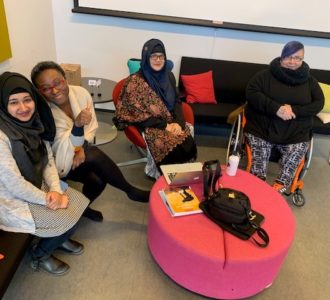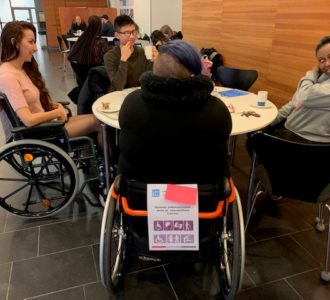A multi-disciplinary group of students from Laurea (Degree Programmes of Social Services, and Nursing, and Restaurant Entrepreneurship) conducted a study about diversity and accessibility at Laurea in March – May 2020. Qualitative research conduction included structured observation, group interviews and video clips with test users.
 Students conducting accessibility research at a Laurea campus (picture: Leena Kuosmanen)
Students conducting accessibility research at a Laurea campus (picture: Leena Kuosmanen)
The results indicated that in general, Laurea is rather accessible. At the same time the study showed that there is a space for improvement in counselling international students using Learning by Developing approach. The best learning outcome from the students’ point of view was gaining knowledge and understanding of multicultural Laurea, which is based on respect, the sense of belonging and tolerance. Digital accessibility became very important, because the research conduction was carried out during the first wave of Corona pandemic.
Accessibility and diversity in campus
Accessibility supports a person’s physical, psychological, social and pedagogical wellbeing. It means equal access to services in the institution, usability of equipment (ICT) and comprehensibility of information. Furthermore, it is about social participation in education and having a feeling of security. It provides active participation in decision making in one’s own life and choices and career options, and in belonging in the institution. Student services provide information on the students’ rights and duties. (OHO-hanke 2019, The Accessibility Center ESKE 2021; ESOK Finland 2020; Ohjaussuunnitelma 2018.)
Each student is unique. Diversity refers to cultures and languages, ethnic background, religion, belief or philosophy. Furthermore, it is about manners, power distance in behaviour, special diet and sexual orientation. A helping equipment because of mobility, hearing or vision impairment, can be vital for some students. (The Finnish Association of People with Physical Disabilities 2021).
There are students with adaptation and mental wellbeing and learning issues. Partly, because they come from different education system and culture, and partly, because adaptation to Finland and Laurea can be challenging. Learning problems can be permanent (for example dyslexia or other diagnosed learning disability) or temporary due to their stress reaction. A student’s learning potential is important to recognize. The aim is to minimize barriers and offer right-time individual and group guidance for students during their study path. (Esteetöntä opiskelua 2021; Opintopolku 2021.)
Results and development ideas
Qualitative research conduction included structured observation, group interviews and video clips with test users in March -May 2020. There are eight (8) criteria in the Accessibility Criteria for Higher Education Institutes. The criteria were combined to pairs, making four of them. (OHO-project, Ministry of Culture and Education and Jyväskylä UAS 2019).
- Values, Attitude and Culture, and Management.
- Physical Environment and Digital Accessibility.
- Teaching and Support and Learning and Guidance.
- Communication and Student Selection.
Values, attitude, culture and management – is Laurea accessible for all?
Laurea strategy and management is seldom presented to students in a comprehensive way. However, Laurea operates on its written strategies and values in practice. Laurea can show corporate responsibility by providing more information on accessibility in different marketing channels. Lack of valid information in external Laurea’s sources (www-sites) can lead to a person’s segregation from higher education.
“I fear there are people who think they cannot manage in higher education with a helping equipment. I can.”
It is important, accessibility is openly and actively discussed using correct and neutral definitions at Laurea and in partner networks in different occasions, wellbeing events and in Alumni network. Partial-abled students, graduates and Alumni, are presented as competent and capable work force in their career paths.
Students are not systematically included in the development of curricula. Understanding and respecting the richness of traditions and values, for example annual fiesta in Finland, Spring Festival (Chinese New Year) and Ramadan in study planning and in campus life should be highlighted. Accessibility in broad perspective is missing as core competence in all curricula.
“It would be important to learn more about each other and their cultures in annual calendar. We don’t’ see diverse students in home university.”
As a conclusion, Laurea supports equality and promote communality and solidarity quite well. Laurea tends to take the diversity of students into account, such as their individual needs, strengths and situations in life. It is important, accessibility is discussed and monitored in long-term design and investment, implementation and development actions systematically.
Physical Environment and Digital Accessibility
 Students conducting accessibility research at a Laurea campus (picture: Leena Kuosmanen)
Students conducting accessibility research at a Laurea campus (picture: Leena Kuosmanen)
The aim is to provide learning environments and student services for all without confronting physical or mental barriers. Students see physical environment and digital accessibility equally as one.
“I don’t see difference between physical and digital learning places.”
New campuses are physically accessible by the book, but the level of accessibility varies in older campus buildings. The most important thing is to find the main entrance with easy access. Signalization in Finnish and English with contrast colours on campuses is renewed and they are visible from the distance. Automatic doors, elevators and wide corridors are independently accessible for most students. For a wheelchair user to open the fire door, she/he needs a helper. Electronic signage, information screens are too placed too high in campus lounges. Students feel secure at the campus when there is a person at the information desk to assist and guide, to keep eye on. Customer and student service are important in promoting physical accessibility.
In addition to signalisation, to use simple symbols in different service environments and points is understood by all regardless the language. The places to use them, are for example, in parking site, elevator, restaurant, office and toilet. Please, Priority for People with Special Needs. Thank you. Gender-neutral toilets are ok for Western people. On the contrary, most Asian or African students demand for separate washrooms for man and woman due to their culture, religion, sensitivity and power distance.
“It is impossible in my country.”
Digital learning environments support students with their special needs as they can study in their own peace and rhythm, using different leaning channels and tools. The level of competence in using digital tools could improve, because there are gaps in digital skills amongst teachers and students. Office 365 education and practise including easy to use tools as generic competence is recommended in the beginning of studies. As a conclusion, Laurea has recognized the need for Digi-tools for the beginners and started providing material and education for staff members and students.
Teaching and learning, support and guidance
Teaching and guidance is an active pedagogical approach from teachers to help students in their academic learning and developing professional competence. Study support and guidance from student services is important to students to help them maintain their motivation, mental health and enjoyment in studies. Learning follows as a result of active participation in learning process. At Laurea studying and learning is individual and collective in teams. Language and Culture Tandem studies is an idea to learn about diversity, richness of cultures and accessibility in broad perspective.
“Teachers are nice, but sometimes I don’t understand what they say.”
Students have an impact on saying a word on their studies and how that is organized at Laurea. The quality is measured by Student Satisfaction Surveys regularly, which is not very effective, because students do not see the improvement in practise. Instead of Student Satisfaction Surveys, Student Need Surveys are recommended. Students want to express their opinion on what they are missing in the education and providing ideas on how to develop education.
“We are encouraged to give feedback, though I’m not sure if it has any impact.”
Recognizing Prior Learning and Competence
A major challenge for Laurea is to recognize student’s prior learning and competence level in reference to Finnish and European qualification requirement context. Numerous students have a degree or master’s degree from their home country. It demands knowledge from Laurea to know about students’ home countries education infrastructure and curricula and qualification requirement. There is risk of misunderstanding and loosing competence due to lack of sufficient understanding on different cultures in Finland.
Communication and Student Selection – Promoting Accessibility Actively
The aim is to reach audience and students with correct, clear and up-dated information on the accessibility at Laurea. Laurea has clear communications processes and practices, and they take accessibility to some extent into account. Laurea could use diversity and cultural richness as a resource, share students’ success stories in communication and marketing actively. Furthermore, it is recommended Laurea Event organisers and Student Union update instructions on how to implement accessible communication and services in their activity.
“I have not seen a student on a wheelchair in any marketing. In entrance exams everything worked well for me.”
Conclusion
Students feel satisfied in accessible learning environments with support from teachers and wellbeing professionals. Quality studying at Laurea means deep learning, knowledge for future and participatory learning techniques in modern learning environments.
“We need ways and means, resilience skills, to cope with information intensive labour market, where qualification requirements are renewed, in national and global level. We are the resource and investment for the future at Laurea.”
References:
- Esteetön korkeakoulu 2021. Esteetöntä opiskelua. ESOK. 2021. http://www.esok.fi/ Viewed on 27.5.2021.
- Esteetöntä opiskelua 2021. OHO!-hanke edistää opiskelun saavutettavuutta — ESOK Viewed on 24.5.2021.
- The Finnish Association of People with Physical Disabilities. Invalidiliitto. 2021. Esteettömyys ja saavutettavuus. The Finnish Association of People with Physical Disabilities | Drupal (www.invalidiliitto.fi) Viewed on 27.5.2021.
- Kuosmanen, L. 2017. Onko julkisissa kulkuneuvoissa helppo liikkua? Lindström J., Kuparinen K. (Eds.)., (2017). Yhdessä enemmän. Oppimisen paikkoja ja suuntia (42-47). Laurea Julkaisut 87., Laurea-ammattikorkeakoulu. URN:ISBN:978-951-799-479-0
- Kuosmanen, L. 2019. Thoughts and Stories about Student Wellbeing in an International Education Institution. Suvi Sivén (toim.) (2019). Ohjaajuus ja tuutorointi Laurea Certified Tutor –koulutuksessa (52-54). Laurea Julkaisut 126.
- Kuosmanen, L. ja Kojo, L. 2019. Esteettömyys ja saavutettavuus Laureassa. Suvi Sivén (toim.) (2019). Ohjaajuus ja tuutorointi Laurea Certified Tutor –koulutuksessa (23-28). Laurea Julkaisut 126.
- Laurea 2020.The Ethical Guidelines of Laurea University of Applied Sciences. Viewed on 24.5.2021.
- Laurean ohjaussuunnitelma. 2018. https://intra.laurea.fi/fi/opetus/koulutuksentoteutus/ohjaus/Ohjaussuunnitelma/Sivut/default.aspx. Viewed on 27.5.2021.
- Opintopolku. Study Info. 2021. Esteettömyys ja oppimisen tuki. https://opintopolku.fi/wp/valintojen-tuki/esteettomyys-ja-oppimisen-tuki-oppilaitoksissa/. Viewed on 20.5.2020.
Videos: